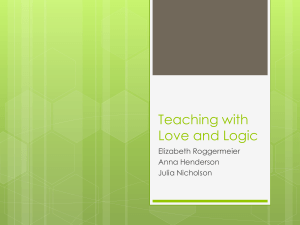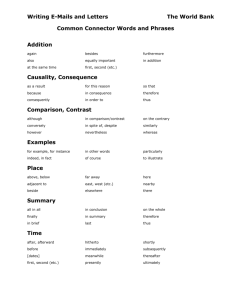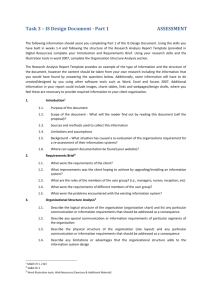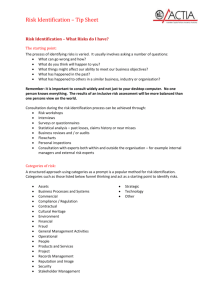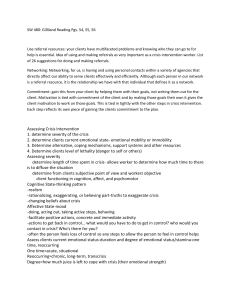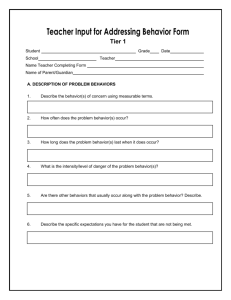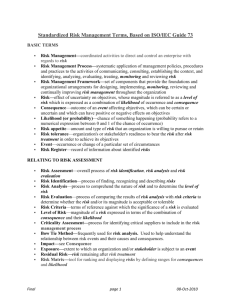Love and Logic – A Quick Guide
advertisement
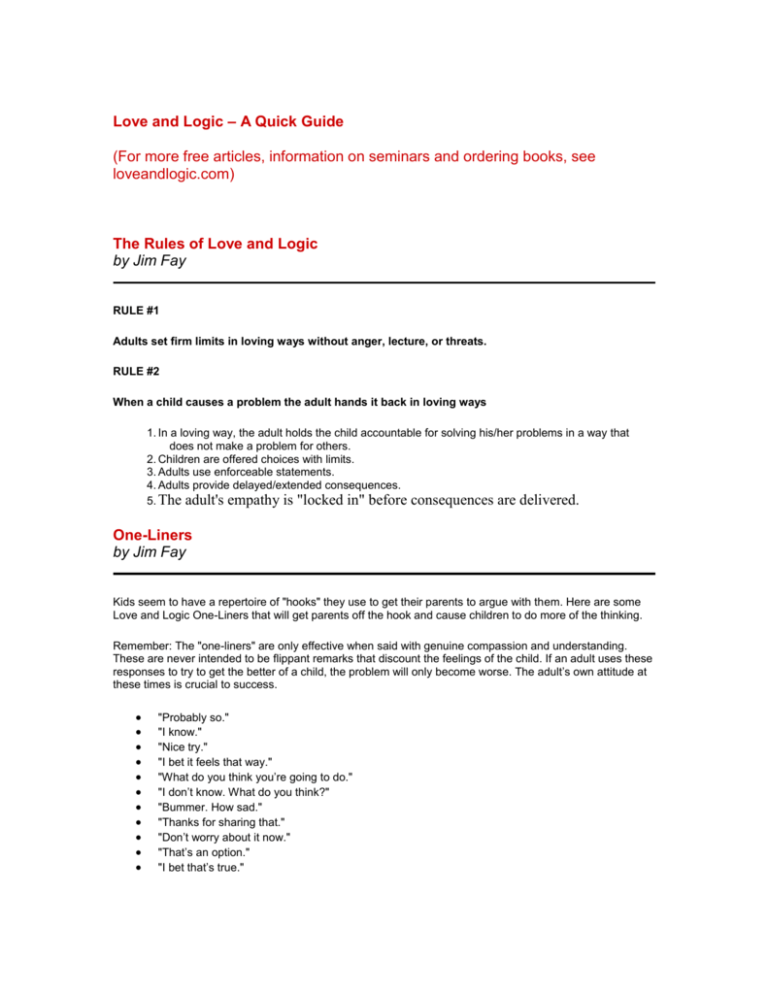
Love and Logic – A Quick Guide (For more free articles, information on seminars and ordering books, see loveandlogic.com) The Rules of Love and Logic by Jim Fay RULE #1 Adults set firm limits in loving ways without anger, lecture, or threats. RULE #2 When a child causes a problem the adult hands it back in loving ways 1. In a loving way, the adult holds the child accountable for solving his/her problems in a way that does not make a problem for others. 2. Children are offered choices with limits. 3. Adults use enforceable statements. 4. Adults provide delayed/extended consequences. 5. The adult's empathy is "locked in" before consequences are delivered. One-Liners by Jim Fay Kids seem to have a repertoire of "hooks" they use to get their parents to argue with them. Here are some Love and Logic One-Liners that will get parents off the hook and cause children to do more of the thinking. Remember: The "one-liners" are only effective when said with genuine compassion and understanding. These are never intended to be flippant remarks that discount the feelings of the child. If an adult uses these responses to try to get the better of a child, the problem will only become worse. The adult’s own attitude at these times is crucial to success. "Probably so." "I know." "Nice try." "I bet it feels that way." "What do you think you’re going to do." "I don’t know. What do you think?" "Bummer. How sad." "Thanks for sharing that." "Don’t worry about it now." "That’s an option." "I bet that’s true." "Maybe you’ll like what we have for the next meal better." "What do you think I think about that?" "I’m not sure how to react to that. I’ll have to get back to you on it." "I’ll let you know what will work for me." "I’ll love you wherever you live." Turn Your Word Into Gold The Art of Enforceable Statements for the Home by Jim Fay Ineffective Technique Love and Logic Technique Please sit down. We're going to eat now. We will eat as soon as you are seated. Please be quiet. I can't listen to your brother when you are both talking at the same time. I'l be glad to listen to you as soon as your brother has finished talking to me. Clean your room so we can go shopping. I'll be happy to take you shopping as soon as your room is clean. I'm not going to play ball with you until all of you are quiet. I'll be happy to play ball with you as soon as it is quiet. Don't talk while I'm reading to you. I will start reading to you again as soon as you have finished talking. You can't go play until you have finished your homework. Feel free to go play as soon as you have finished your homework. Don't shout at me. I listen to people who do not yell at me. Pay attention. I'll start again as soon as I know you are with me. Don't be bothering your sister. You are welcome to stay with us as long as you are not bothering your sister. Keep your hands to yourself. Feel free to stay with us when you can keep your hands to yourself. Do your chores on time or you'll be grounded. I'll be happy to let you go with your friends as soon as your chores are finished. Don't talk to me in that tone of voice! I'll listen as soon as your voice is as calm as mine. You show some respect. I'll be glad to discuss this when respect is shown. Don't be late coming home from school. I drive those to practice who arrive home on time. I'm not picking up your dirty clothes. I'll be glad to wash the clothes that are put in the laundry room. Keep your room neat. All owners of neat rooms are welcome to join us for ice cream. I'm not loaning you any more money. I lend money to those who have collateral. If you can't remember your pencil, you're just going to have to do without. Feel free to borrow from anyone but me. You're not going out without your coat. You may go out as soon as you have your coat. You're not going to stay in this group and act like that. You may stay with us if you can give up on that behavior. Don't you come back to this room until you can show some respect! Feel free to come back to the room as soon as you are calm. Quit breaking the rules of the game. Those who can follow the rules are welcome to play the game. Get this room cleaned up right now, and I mean it! You are welcome to join us for __________as soon as your room is clean. Stop arguing with me. I'll be glad to discuss this with you as soon as the arguing stops. If you can't treat the paintbrushes right, you'll just have to sit out this project. All of those who can handle the paintbrushes right are welcome to join us in the project. If you forget your permission slip, you're going to miss the trip. All of those who remember permission slips are welcome to go on the field trip. Guidelines for Sharing Control Through Choices by Jim Fay Never give a choice on an issue that might cause a problem for you or for anyone else. For each choice, give only two options, each of which will be OK with you. If the child doesn't decide in ten seconds, decide for him or her. Only give choices that fit with your value system. Some Love and Logic Examples of Little Choices 1. Would you like to wear your coat or carry it? 2. Are you going to clean the garage or mow the lawn this week? 3. Will you have these chores done tomorrow? Or do you need an extra day to get them finished? 4. Are you having peas or carrots as your vegetable tonight? 5. Are you going to bed now? Or would you like to wait 15 minutes? 6. Can you stay with us and stop that, or do you need to leave for a while and come back when you are sweet? 7. Are you going to put your pajamas on first or brush your teeth first? 8. Will you be home at 10:00? Or do you need an extra half hour with your friends? 9. Are you guys going to stop bickering? Or would you rather pay me for having to hear it? The Instant Empathetic Response by Jim Fay Some Benefits of Delivering Love and Logic Consequences with Empathy The child is not distracted by the adult's anger The child must "own" his or her pain rather than blaming it on the adult. The adult-child relationship is maintained. The child is much less likely to seek revenge. The adult is seen as being able to handle problems without breaking a sweat. Keep Your Empathy Short, Sweet, Simple, and Repetitive Most adults find it difficult to deliver empathy when a child has misbehaved. The more natural tendency is to show anger, threaten, and lecture. Parents generally find it much easier to pick just one Love and Logic empathetic response to repeat over and over with their kids. When children hear this same statement repeated over and over, they learn two things: 1. My parents care about me. 2. My parents aren't going to back down. No use in arguing! Pick Just One Love and Logic Empathetic Response and Use It Repeatedly Examples: 1. This is so sad. 2. Bummer. 3. Ohhhhh...this is hard. The Power of Nonverbal Communication Studies estimate that between 70% and over 90% of what we communicate we do without words through subtle nonverbal gestures. Research also reveals that children are experts at decoding these nonverbal cues. When delivering empathetic responses, the delivery is as important as your actual words! Avoid sarcasm at all costs The Delayed or "Anticipatory" Consequence Immediate consequences work really well with rats, pigeons, mice, and monkeys. In real-world classrooms, they typically create more problems than they solve. Problems with Immediate Consequences: 1. Most of us have great difficulty thinking of an immediate consequence while we are teaching. 2. We "own" the problem rather than handing it back to the child. In other words, we are forced to do more thinking than the child. 3. We are forced to react while we and the child are upset. 4. We don't have time to anticipate how the child, his/her parents, our administrators, and others will react to our response. 5. We don't have time to put together a reasonable plan and a support team to help us carry it out. 6. We often end up making threats we can't back up. 7. We generally fail to deliver a strong dose of empathy before providing the consequences. 8. Every day we live in fear that some kid will do something that we won't know how to handle with an immediate consequence. Take care of yourself, and give yourself a break! Here's how: The next time a student does something inappropriate, experiment with saying, "Oh no. This is so sad. I'm going to have to do something about this! But not now...later. Try not to worry about it." The Love and Logic Anticipatory Consequence allows you time to "anticipate" whose support you might need, how the child might try to react, and how to make sure that you can actually follow through with a logical consequence. This Love and Logic technique also allows the child to "anticipate" or worry about a wide array of possible consequences. The Love and Logic Anticipatory Consequence technique gains its power from this basic principle of conditioning. When one stimulus consistently predicts a second, the first stimulus gains the same emotional properties as the second. Stated simply: When "try not to worry about it" consistently predicts something the child really must worry about, "try not to worry about it" becomes a consequence in and of itself...an "Anticipatory" Consequence. The Love and Logic Generic Consequence by Jim Fay What do you do when a child has caused a problem or violated a rule and there appears to be no reasonable consequence available? Love and Logic parents know the answer to this one. They use household chores for the consequence. However, they use chores in a very special way so that the youngster can make a reasonable connection to his/her doing the parent's work, and the rule violation. It's all in the delivery Love and Logic Parent: "Winston. You snuck out and spent the night hanging out in the convenience store parking lot. Then you climbed back in your window, thinking I would never know about it. I told you I would have to do something about that, but I'm sorry to say that I haven't figured it out yet even though I've spent hours on it." "Do you know what's sad about that? I can't do two things at once. What I was going to do with my time was clean up all the dog messes in the backyard, rake the leaves, and edge the lawn and sidewalk. So...I guess as soon as you have those jobs done, we'll forget about this problem of yours. Thank you. You don't need to work on those jobs right now. Just have them done by the end of the day on Saturday. Thanks, pal." If there is any doubt about how this parent is going to guarantee that Winston accomplishes these tasks, study the Love and Logic audiotape "Didn't I Tell You to Take Out the Trash?" Two Ways to Neutralize Childhood Arguing by Jim Fay 1. LOVE AND LOGIC INSTANT EMPATHETIC RESPONSE The expression of genuine empathy has the amazing ability to soak up emotions. Learn to use an empathetic statement that comes right from your heart. Use the statement that feels natural to you. Use it every time. Examples of empathetic statements that work: "Oh, no. I bet that feels terrible." "Wow. What a bummer." "I can't imagine how bad that feels." Examples of statements that don't work: "I know how you feel." "I know just what you mean." "I understand." 2. LOVE AND LOGIC ONE-LINERS TO NEUTRALIZE ARGUING It is important that Love and Logic One-Liners be used in the "broken record" form. Example of a Love and Logic One-Liner that should become a habit for you: "I love you too much to argue." Sample dialogue: Child: You never let me do what I want. Parent: I love you too much to argue about that. Child: But Sally always gets to do what she wants. Parent: I love you too much to argue about that. Child: Yeah, that's cause you like her better. Parent: I love you too much to argue about that. Come talk to me later about something fun. See you, sweetie. Thanks. ©1999 Jim Fay Permission granted for photocopy reproduction. Please do not alter or modify contents. For more information, call the Love and Logic Institute, Inc. at (800) 338-4065.
